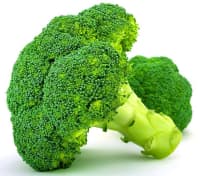Broccoli
Composition
- Broccoli sprout juice contains sulforaphanyl-amine.[1]
- Broccoli sprouts are naturally enriched in glucoraphanin,the biological precursor to the anticancer compound sulforaphane.[1:1]
- Vitamin C
- Flavonoids
- Glucosinolates
Broccoli as good sources of calcium.
Healing Properties
Anticancer (anticancer)
Antiinflammatory
Broccoli is effective in preventing inflammatory responses.[2]
Prostate Health
Weight Loss
Hepatic Protection
(prevent damage to the liver) Dietary broccoli exerts a substantial protective effect on the liver.[3]
-
Broccoli consumption helps reduce plasma alanine aminotransferase concentrations in the liver. This is an enzyme found in the liver, normally at low levels. Increased levels of this enzyme are associated with liver damage and its level is used to screen for and/or monitor liver disease.[3:1]
-
Sulforaphane (an active compound in broccoli) protects against liver damage, indicating its potential to treat liver diseases.[2:1]
Sulforaphane from broccoli reduces inflammation and liver cancer risk[4]
Sulforaphane (SF), a broccoli-derived isothiocyanate, inhibits the secretion of pro-inflammatory cytokines. SF was shown to suppress liver inflammation within 24hrs of treatment. SF was not associated with any cellular toxicity, indicating the protective effect of SF against inflammatory responses. This study revealed the potential usage of broccoli-derived SF as a functional food ingredient in attenuating liver inflammation and reducing liver cancer risk development.[4:1]
Disease / Symptom Treatment
Cancer Treatment / Prevention
Medicinal vegetables such as broccoli and their derivative phyto-compounds are being increasingly recognized as useful complementary treatments for cancer. Indole-3-carbinol (I3C), a natural phytochemical found in cruciferous vegetables (i.e. broccoli, cabbage or cauliflower), is considered a potential anticancer agent that prevents the development of certain types of tumors by activating tumor suppressor genes, genes involved in apoptosis and detoxification. I3C suppresses cell proliferation and induces apoptosis.[5]
- Broccoli is effective in preventing carcinogenesis.[2:2]
Breast Cancer
Bladder Cancer
Colorectal cancer
Prostate Cancer
Liver Cancer
Sulforaphane from broccoli reduces inflammation and liver cancer risk[4:2]
Sulforaphane (SF), a broccoli-derived isothiocyanate, inhibits the secretion of pro-inflammatory cytokines. SF was shown to suppress liver inflammation within 24hrs of treatment. SF was not associated with any cellular toxicity, indicating the protective effect of SF against inflammatory responses. This study revealed the potential usage of broccoli-derived SF as a functional food ingredient in attenuating liver inflammation and reducing liver cancer risk development.[4:3]
Ovarian cancer
Cervix carcinoma
Hepatocellular carcinoma (HCC)
(a form of liver cancer) Long-term consumption of whole broccoli countered development of hepatic tumorigenesis.[3:2]
Diabetes
Broccoli is effective in preventing diabetes.[2:3]
Obesity
Non-Alcoholic Fatty Liver Disease (NAFLD)
(hepatic lipidosis) Long-term consumption of whole broccoli countered NAFLD development enhanced by a Western diet.[3:3]
- Dietary consumption of freeze-dried broccoli was shown to lower the level of hepatic triglycerides.[3:4]
- Dietary broccoli decreased relative liver mass.[3:5]
Title: Glucoraphanin and sulforaphane evolution during juice preparation from broccoli sprouts
Publication: Food Chemistry
Date: 19 June 2018
Link: Source ↩︎ ↩︎Title: Hepatic protective effects of sulforaphane through the modulation of inflammatory pathways
Publication: Journal of Asian Natural Products Research
Date: March 2019
Archive: archive, archive-mirror ↩︎ ↩︎ ↩︎ ↩︎Title: Dietary Broccoli Lessens Development of Fatty Liver and Liver Cancer in Mice Given Diethylnitrosamine and Fed a Western or Control Diet
Publication: The Journal of Nutrition
Date: Feb 2016
Link: Source ↩︎ ↩︎ ↩︎ ↩︎ ↩︎ ↩︎Title: Sulforaphane from broccoli attenuates inflammatory hepcidin by reducing IL-6 secretion in human HepG2 cells
Publication: Journal of Functional Foods
Date: September 2020
Archive: archive, archive-mirror ↩︎ ↩︎ ↩︎ ↩︎Title: Phytotherapy of Prostate Cancer: How far are we?
Publication: Clinical Oncology: Case Reports
Date: 2018
Link: Source ↩︎
